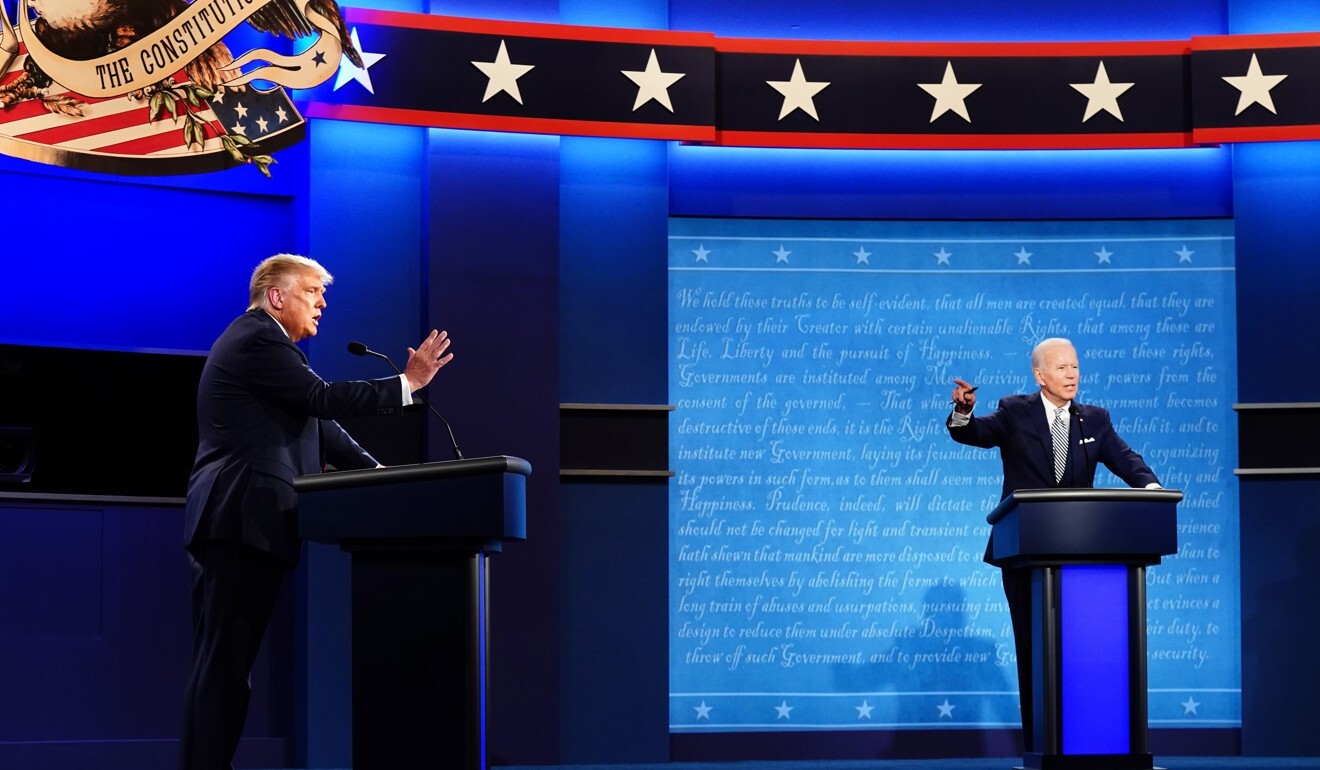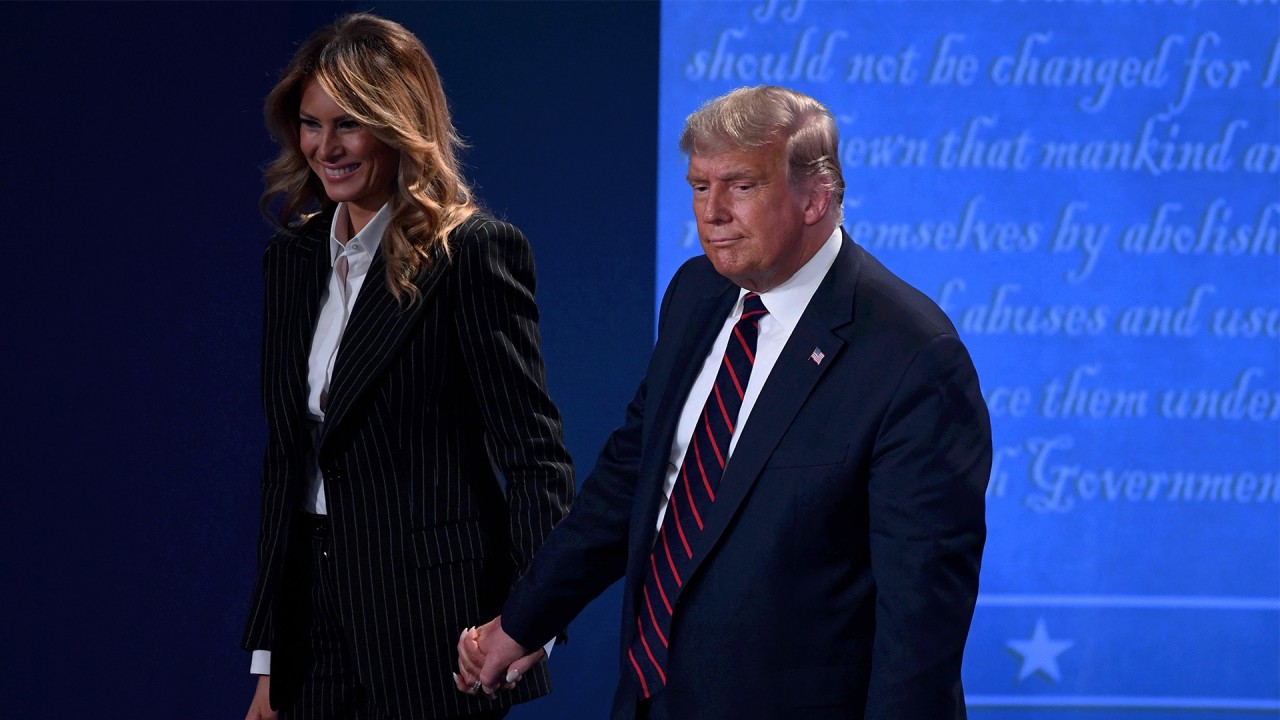
New Zealand’s mundane election: like Narnia to America’s Trumpian apocalypse
- As Lincoln promised, government of the people, by the people, and for the people has survived – but perhaps not where he thought
- Ardern versus Collins, Trump versus Biden: only one of these debates showed the signs of a functional democracy
In recent weeks, signs have popped up all over this part of Auckland bearing an oversized photograph of a young man in a suit.
He is slim, clean-cut, a harmless looking greenhorn, the sort of young man who seems too insubstantial to hold up the very suit on his body. If you didn’t know any better, you might mistake him for the assistant manager at the electronics store. But this is in fact Simeon Brown, our area’s 29-year-old member of parliament. The signs are for his campaign for re-election.
In opinion polls published on October 8, Labour was ahead of National 47-32, and 50 per cent of voters preferred Ardern as prime minister, while only 23 per cent preferred her chief competitor.
If Labour can win an outright parliamentary majority, then it will be able to form a government on its own without allying with any of the minor parties.

That would be exceptional under New Zealand’s system of proportional representation, and that may be the most notable observation that one can make about this election. Which is to say that, turbulent though the outside world seems to be, New Zealand politics is largely playing out the way it always does.
The contrast with the US election, scheduled for November 3, couldn’t be more stark.
One of the two heads of governments involved treated her opponent with respect. The main takeaway from the second Ardern-Collins debate seems to be Ardern’s admission to having smoked marijuana years ago, a revelation that New Zealanders greeted with a collective shrug.

The policy disagreements among New Zealand’s political parties are the bread-and-butter discourse that happens in a liberal democracy: has the government done a good job on public health and can it do better?
As New Zealand votes, Ardern and government walk a fine line on China
Ardern and Labour will probably prevail. But if not? There is no question of whether she will vacate the PM’s office in the event of an upset victory for National. There is no claim of voter fraud. There is no voter suppression. Whatever the results of the October 17 election, Kiwis fully expect their country and their system of government to continue to function as in the past.
In contrast, President Trump has repeatedly both questioned the integrity of the US electoral system and worked to undermine it.

04:42
Trump returns to the White House after only three days in hospital for Covid-19 treatment
If the election does not go his way, he has said, then by definition the process must be corrupt. He has implicitly threatened to call for violent actions by his supporters in the event of such a result. And he has indicated that he will not relinquish his position no matter what.
But, whether Trump lives or dies, Trumpism remains on the ballot in November. In fact, the issue of his health is inextricably tied to the peaceful and legitimate transfer of power that he has called into question.
If he lives, then Trump will surely continue to deny the validity of the election and to insist that he must stay in power regardless of the polls. If he dies, perhaps America will be spared a tyrant, but Americans will also be robbed of the opportunity to reject tyranny.
In the end, New Zealand is a small, peaceable, harmless country, as harmless and inconsequential as Simeon Brown looks. Other countries do not look to New Zealand for leadership or as a model for emulation.

To many people around the world, New Zealand seems more a paradisal idea than an actual place, more like its film incarnations like Narnia or Middle Earth than a real country with real people in it with real problems.
In contrast, the US is the world’s oldest major democracy as well as its leading power. As the saying goes, “When America sneezes, the rest of the world catches a cold” – a saying made all too literal and even macabre in the age of Covid-19.
On the battlefield of Gettysburg, Abraham Lincoln said that the American Civil War posed the question of whether a nation “conceived in liberty, and dedicated to the proposition that all men are created equal … can long endure”.
President Pelosi? Pence prepares to risk it all for Trump
This is not a question belonging to any one nation or people; it is a question whose answer all mankind is anxious to know. And this is the question on the ballot in the US election this year.
As a student of American constitutional law, I have an additional reason to want to know. What of all that I learned from the fancy American institutions I attended?
What of the vaunted checks and balances supposedly built into the constitution, which Alexander Hamilton and James Madison expounded upon in the Federalist Papers? What of that famous separation of powers that the Supreme Court examined in such canonical cases as Marbury v. Madison and Youngstown Steel v. Sawyer?

03:30
World leaders wish Trump and Melania speedy recovery from Covid-19
Why did I spend those long evenings parsing the fine points of law if all it takes to destroy them is a reality television host and con man with obvious psychological problems?
All of which is enough to make one treasure a boring, mundane, and relatively inconsequential election down under. All of which is enough to make one cherish even an unremarkable personality like Simeon Brown and his reedy image, plastered all over this neighbourhood.
Or maybe it makes the New Zealand election not so inconsequential after all. Maybe the New Zealand election will be significant precisely because it is mundane. As Lincoln promised, government of the people, by the people, and for the people shall not perish from the earth – even if it only survives in Narnia.
William Han is a lawyer and writer. Born in Taiwan and a citizen of New Zealand, he is a graduate of Yale College and Columbia Law School

